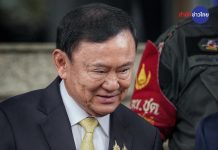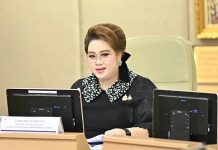Head of the National Council for Peace and Order (NCPO) General Prayuth Chan-ocha has urged the international community to join Thai people in reforming Thailand, which would lead to a future of long-lasting relations.
In his televised public address on “Return Happiness to the People,” General Prayuth explained that Thailand was trying to build foundations for a strong democracy, which would lead to more sustainable and mutually beneficial partnerships with the international community.
He explained that the problems existing before 22 May 2014 included the delay in reimbursements to farmers for the rice-pledging scheme; the deaths and injuries of innocent people caused by the use of war weapons; and the inefficient administration of the country by an acting government with limited powers, hindering implementation of the current budget and the new proposals for the Fiscal 2015 budget. These problems would have led to major problems in the future if no action was taken.
Moreover, negotiations for reform and elections could not be held, because conflicting parties refused to compromise and reduce their demands. Businesses, academics, and other people involved had continually tried to find ways to achieve a peaceful compromise, but there were many legal obstacles, which had resulted in looming civil disorder and civil war.
General Prayuth stated that the army had monitored the situation closely and deemed it necessary to step in, in order to resolve the situation immediately. The first act was to halt the use of violence between conflicting groups and stop the protracted protests. The effort happened just in time to prevent a potentially bloody civil war. And then, the tensions and the sufferings of the people quickly subsided.
He called on Thais and friends of Thailand to look forward to the future and find ways to prevent what had happened time and time again in the past from reoccurring, and to find ways to achieve democracy for Thailand.
He said that countries that are friends of Thailand cannot deny Thailand’s role as an important partner of many global powers. Thailand is the oldest ally in Southeast Asia of the United States and of many other Western countries. Bangkok is the location of the United Nations Economic and Social Commission for Asia and the Pacific and it is also the site of regional offices of many international organizations. China, Japan, South Korea, India, Australia, and New Zealand are also partners of Thailand. Moreover, Thailand is a partner in a number of regional and international cooperation frameworks.
He said that Thailand is one of the largest economies in ASEAN. It has contributed to the creation of many production bases, services, and joint investments. The country also played a leading role in the establishment of ASEAN and the Asia Cooperation Dialogue (ACD), and it is an active member of the Asia-Pacific Economic Cooperation (APEC), the Asia-Europe Meeting (ASEM), and the East Asia Summit (EAS), in which both the United States and Australia are members.
General Prayuth pointed out that in stepping in to make rearrangements for sustainability, the NCPO has not changed the country’s economic foundations, nor has it prevented the country from achieving future economic growth in ASEAN and the international community.
He said that Thailand did not want its friends to constrain the constructive role of the military or NCPO. In this regard, he called on the international community to allow Thailand to continue to participate in the global stage, which should be more favorable to other countries.




